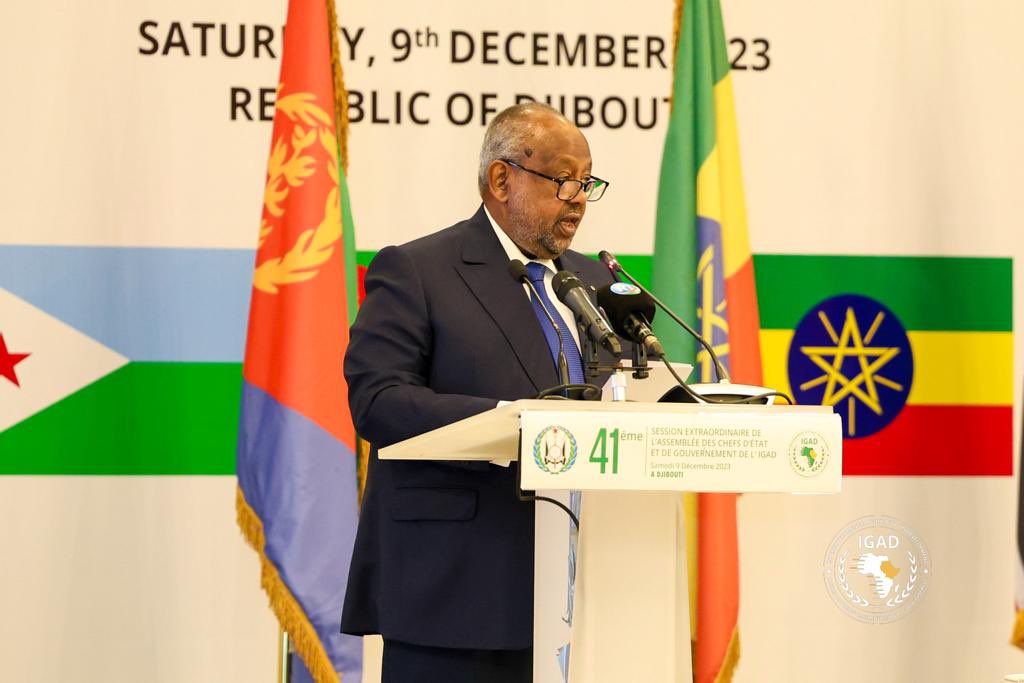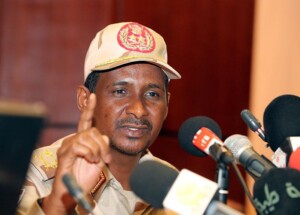IGAD will ‘redouble efforts’ to achieve peace and democracy in Sudan

Djibouti President and IGAD Chairperson Ismail Guelleh during his address to the 41st Extraordinary Assembly session in December 2023 (Photo: IGAD Secretariat)
In the extraordinary assembly session on the situation in Sudan that took place in Djibouti on Saturday, the member states of the Horn of Africa Intergovernmental Authority on Development (IGAD) agreed to redouble efforts to achieve a peaceful resolution to the ongoing war between the Sudanese army and the paramilitary Rapid Support Forces (RSF). Rival commanders El Burhan and Hemedti have agreed to a one-to-one meeting. The IGAD members will support a civilian-led political process that will move Sudan “to a viable, civil democratic rule”.
Following the failure of the US-Saudi led peace talks in the Saudi Arabian city of Jeddah last week, the IGAD heads of state, already preparing to organise negotiations between the commanders of the Sudan Armed Forces (SAF) and the RSF, held an emergency session on Sudan on Saturday.
The session was attended by SAF Commander and Sudan’s Sovereignty Council President Lt Gen Abdelfattah El Burhan, Kenyan President William Ruto, Ethiopian PM Abiy Ahmed, Somali President Hasan Sheikh Mahmud, AU Commission President Moussa Faki, and representatives of the UN, USA, and EU. An RSF delegation travelled to Djibouti to discuss the situation with IGAD heads of state on the margins of the summit.
“The violence threatens the country’s existence and regional stability. Today’s summit is a beacon of hope. Sudan needs peace”, Djibouti President and IGAD Chair Ismail Guelleh said in a statement on Saturday. He demanded an immediate ceasefire in Sudan.
IGAD Secretary General Workneh Gebeyehu said in a message on X (formerly Twitter) that he was pleased with “the constructive discussions” on addressing the conflict in Sudan. “The [IGAD] Assembly effectively secured a commitment from the Sudanese belligerents to promptly convene & agree upon a cessation of hostilities—a crucial step in addressing the aspirations of the Sudanese people!”
One-to-one meeting
According to the communiqué of the IGAD session, the assembly welcomed El Burhan’s approval of the summit’s proposal to hold a bilateral meeting with RSF Commander Mohamed ‘Hemedti’ Dagalo, with the assistance of IGAD, and appreciated Hemedti’s acceptance, in a “subsequent telephone conversation” with the IGAD heads of state, “of the proposals of the Assembly for an unconditional ceasefire, resolution of the conflict through political dialogue and the holding of a one-to-one meeting” with El Burhan.
The session also agreed to establish “an IGAD framework comprised of respected diplomatic and political interlocutors, nominated by IGAD Heads of Government to undertake the mediation efforts in Sudan”.
Democratic governance
The IGAD summit also approved the Declaration of the Expanded Mechanism on the Crisis in Sudan, issued on December 7, in which the 28 members, including the AU, the Arab League, EU, UN, USA, Russia, China, and a number of Arab and African countries, state that there can be no sustainable military solution to the crisis in Sudan.
“Only an inclusive, representative, Sudanese-owned and Sudanese-led dialogue among all Sudanese stakeholders, including the belligerents, other armed movements, political parties, civil society organizations, women and youth groups, resistance committees, labour unions and professional associations, traditional leaders, and academics, can lead to a peaceful and sustainable solution to the crisis.”
In its communiqué on the session on Saturday, IGAD repeated its commitment “to support a civilian-led inclusive political process that will elaborate the nature and structure of the Sudanese society and governance and move the country to a viable, civil democratic rule.
The assembly therefore “decided to fast-track efforts in organizing an IGAD-AU facilitated all-inclusive Sudanese-owned and Sudanese-led civilian dialogue aimed at forging national consensus towards the formation of a civilian-led transition that will culminate in the holding of open, transparent and democratic elections”.
Welcomed
Sudanese political parties and groups, civil society organisations, and rebel movements all welcomed the outcomes of the IGAD summit in Djibouti on Saturday.
“These steps come while the people are desperately waiting for a solution that will save them and the country from the disaster of war that has exhausted them and destroyed the country’s both green and dry land,” the Civil Democratic Forces alliance Tagaddum said in its response on social media.
The Darfur Bar Association asked the United Nations to intervene and take urgent measures to oblige both sides responsible for the ongoing war in Sudan to stop fighting immediately, before Sudan collapses completely.
Sudan’s newly formed National Mechanism to Support Civil Democratic Transition and Stop the War sent a call to all political and civil forces, resistance committees, professional groups, rebel leaders, civil society leaders and heads of Sufi orders, “to demonstrate historical responsibility and agree on the right steps to stop the war -steps the Sudanese will stand behind without delay or hesitation”.
The spokesperson for the mechanism, Ambassador Ahmed Hussein, told Radio Dabanga on Sunday that “the continuation of the bloody conflict after the suspension of the Jeddah negotiations has by far diminished the sparks of optimism among the Sudanese about a possible return of a normal life”.
Former PM Abdallah Hamdok (2019-2021), chair of the Democratic Civil Forces, also known as Tagaddum (progress in Arabic), a newly established coalition of political parties, professional groups, and civil society organisations concerned with stopping the war and the building of a new, democratic Sudan, met with Salva Kiir, president of South Sudan, on Friday to discuss its six-step roadmap to end the war.











 and then
and then